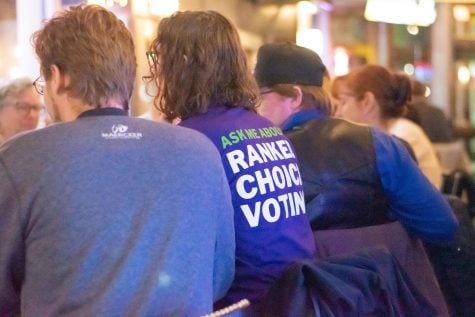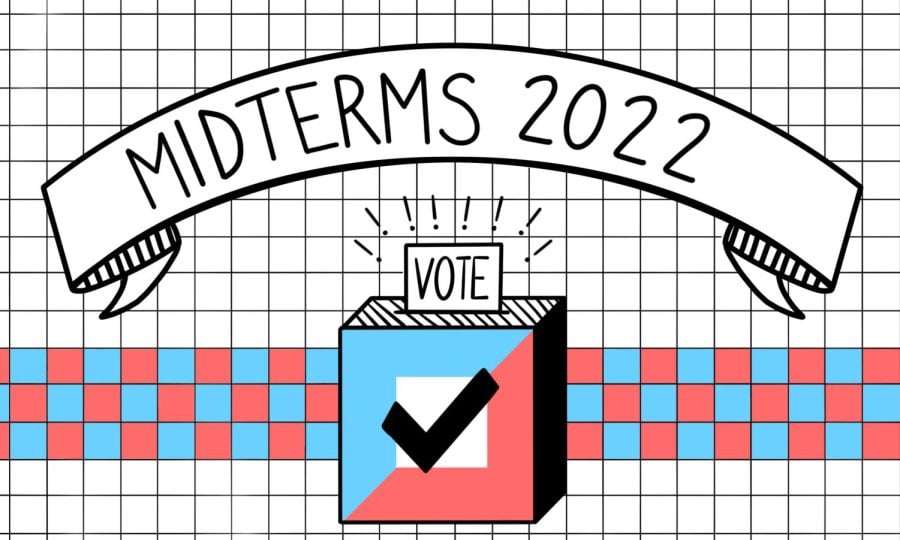Evanston becomes first city in Illinois to adopt ranked-choice voting
Evanston voters approved a referendum that will bring ranked-choice voting to the city’s municipal elections, starting in April 2025.
November 8, 2022
Evanston voters decided overwhelmingly to replace the city’s “winner-take-all” voting system with ranked-choice voting Tuesday night. Proponents of the referendum say the change will lead to fairer elections and less acrimonious campaigns.
The vote made Evanston the first municipality in Illinois to adopt the system. 82% of voters approved the measure with 98% of precincts reporting.
The procedure will go into effect for the city’s spring 2025 mayoral, city clerk and City Council elections. In a ranked-choice voting system, voters rank candidates from highest to lowest preference, instead of voting for a single candidate. If a candidate wins 50% of the first-place votes, they win.
If no candidate secures a majority, the individual with the fewest votes is eliminated and their voters’ second-choice candidates receive their first-place votes. The process continues in rounds until one candidate achieves a majority.
“We’re just so happy to see an overwhelmingly positive mandate from Evanston,” said Rebecca Ratliff, campaign manager for RCV for Evanston.
Ahead of the election, RCV for Evanston organized local volunteers to phone-bank and canvas in favor of the referendum.
Voters’ approval of the referendum swings Evanston away from its current system, in which the candidate with the most votes wins, even if they do not hold a majority. All other elections, including school board races and county elections, will continue to go to the candidate that receives the most votes.

Mayor Daniel Biss is among many Evanston officials that encouraged residents to vote “yes” on the referendum. Biss has long advocated for ranked-choice voting: he introduced a 2017 bill as an Illinois state senator that would have enacted ranked-choice voting for state elections.
The Democratic Party of Evanston also endorsed ranked-choice voting. Jane Neumann (Medill ‘76), who has been the Democratic Party of Evanston’s lead on the initiative, hopes the new system will lead to more inclusive campaigning.
“I think it will result in candidates trying to appeal to a broader group of voters, and I think they’ll have to be a little more civil to avoid alienating voters who oppose them,” Neumann said.
Ald. Devon Reid (8th), who did not support the measure, said he isn’t opposed to ranked-choice voting in principle, but has issues with how the referendum ended up on the ballot.
He said City Council should have introduced a specific ordinance delineating how the system would be enacted, including details like ballot design. Instead, the referendum simply asked voters if they “want” to use ranked-choice voting, without specifics of what it will look like.
“If you look at the wording of the referendum, it’s not instructive as to what we’re adopting. It’s not self-executing,” Reid said. “I think voters indicated a lot of interest in changing our election system, but it’s now up to the council to do this right.”
While it may be the first city in Illinois to adopt the system, Evanston is part of a group of cities and states around the country to use ranked-choice voting. According to electoral reform organization FairVote, 56 cities, counties and states use the system, totaling 11 million voters.
Evanston adds another 51,000 registered voters to this pool, joining the ranks of five cities in Minnesota and one jurisdiction in Michigan in using the system.
Maine and Alaska have adopted ranked-choice voting for both statewide and federal elections. The voting system gained nationwide attention when New York City adopted it for its municipal elections, including the 2021 mayoral race.
Today, Portland, Seattle and Nevada voters also saw ranked-choice voting referendums on their ballots. The measure passed in Portland, while the races in Nevada and Seattle are too close to call.
Solomon Lieberman (Medill ’09), an advisor for RCV for Evanston, said he hopes ranked-choice voting will better support democracy than the antiquated previous system.
“Most of these candidates today are trapped in an antediluvian system,” Lieberman said. “So let’s fix the system and then see what they can do.”
Email: saulpink2025@u.northwestern.edu
Twitter: @saullpink
Email: jacobwendler2025@u.northwestern.edu
Twitter: @jacob_wendler
Related Stories:
— Rep. Robyn Gabel projected to win reelection to statehouse representing District 18
— Incumbent Gov. J.B. Pritzker projected to win gubernatorial race
— Democratic Incumbent Tammy Duckworth projected to win U.S. Senate seat



